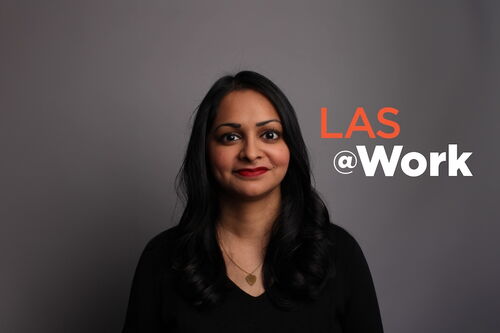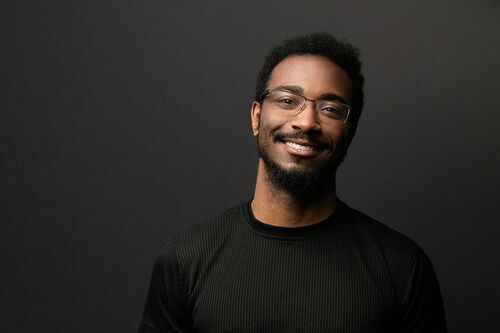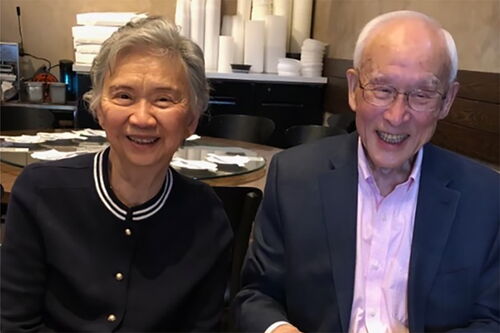Taking the plunge
When Margaret Kosal (PhD, '01, chemistry) isn't throwing herself out of airplanes, she's throwing herself into her job with an equal amount of passion.
Kosal has made over 1,000 jumps since 1997 when she first parachuted as a chemistry graduate student at the University of Illinois at Urbana-Champaign. Jumping is for fun, but it's also representative of the total commitment she brings to her young career as a researcher, teacher, and policy analyst dealing with the non-proliferation of biological and chemical weapons.
Kosal doesn't do anything half-hearted. As a result, she has emerged as one of the nation's leading young experts on chemical and biological defense, says Jean Reed, special assistant for the Chemical and Biological Defense and Chemical Demilitarization Programs in the Pentagon. Kosal has even spoken before the chiefs of the New York City Fire Department on the threats of chemical and biological terrorism.
By building this reputation in so short a time, she has also been named the 2007 winner of the LAS Recent Graduate Award.
"Growing up, I was always aware of the wider world," Kosal says. She credits this awareness to her mother, one of the earliest Peace Corps volunteers. In college, she saw herself as an "armchair arms-control wonk," but today she finds herself in the thick of the debate.
After receiving her PhD in chemistry from U of I in 2001, Kosal and several other students worked with chemistry professor Ken Suslick to form the start-up company ChemSensing, which develops technology to detect volatile organic compounds. (Their motto: "If you can smell it, we can see it.") Kosal was interested in using this technology to detect landmines and chemical and biological agents. But when the company narrowed its focus to detecting upper respiratory infections, Kosal decided she was more passionate about security issues. So she took a postdoctoral fellowship at the Center for Nonproliferation Studies at the Monterey Institute of International Studies in California.
From there, in 2004 she became a science fellow at Stanford University, where she analyzed homeland security exercises, chemical and biological weapon sensors, and the notorious IEDs, or improvised explosive devices, being used by radical Islamists in Iraq. She foresaw the real possibility that IEDs would eventually be used to deliver chemical attacks. Sure enough, by the end of 2006, radicals in Iraq began incorporating chlorine gas into their IEDs.
"In a recent incident, 78 U.S. service members were injured by chlorine gas," she says. "The radicals have used chemistry to ratchet it up one step."
In another project, Kosal did a historical review, analyzing the vulnerabilities of U.S. industrial chemical facilities to terrorist attack. Studying all domestic terrorism attacks on chemical facilities since the early 1960s, she found that every single attack came from outside the chemical plant.
"This was contrary to the major policy directive, which has focused on protecting chemical plants from sabotage by employees from within," she says. Kosal's report had an impact on how chemical plants take defensive measures.
After leaving Stanford, Kosal continued this work as a science and technology adviser within the Office of the Secretary of Defense in the Pentagon. In particular, she dealt with emerging technologies, such as nanotechnology, and how they might be used for counterterrorism and might pose future potential proliferation risks.
She says nanotechnology, the manipulation of matter at the molecular level, could enable many countermeasures, such as the development of sensors to detect biological and chemical weapons, the creation of vaccines that do not need to be refrigerated, and the use of nano-engineered materials for soldiers' personal protective gear.
Kosal is especially proud of the workshop on nanotechnology for chemical and biological defense, which she chaired in January 2007. This workshop brought together 110 experts, including scientists, social scientists, and the military.
Meanwhile, Kosal doesn't skydive as much as she used to, but she continues to do serious mountain hiking—a hobby that she says "speaks to the passion I bring to whatever I'm working on. I tend to be a very intense individual. I really put myself into whatever I'm working on; and if I don't feel committed to that, it's time for me to move on."
Kosal is moving on this year. This fall, she will begin a new teaching position at the Sam Nunn School of International Affairs at Georgia Tech, where she will blend her technical knowledge in chemistry with her policy expertise in international security.








